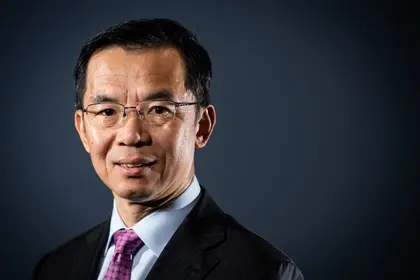China said it respected the "sovereign state status" of all ex-Soviet countries on Monday, April 24, after Beijing's ambassador to France sparked outrage in Europe by questioning the sovereignty of those nations.
JOIN US ON TELEGRAM
Follow our coverage of the war on the @Kyivpost_official.
"China respects the sovereign state status of the participating republics after the dissolution of the Soviet Union," foreign ministry spokeswoman Mao Ning told reporters.
Beijing's ambassador to France Lu Shaye triggered a furore after suggesting that countries that emerged after the fall of the Soviet Union "don't have effective status under international law because there is not an international agreement confirming their status as sovereign nations".
The ambassador's comments appeared to refer not just to Ukraine, which Russia invaded in February 2022, but also to all former Soviet republics which emerged as independent nations after the fall of the Soviet Union in 1991, including members of the European Union.
"China respects the sovereignty, independence and territorial integrity of all countries and upholds the purposes and principles of the UN Charter," Mao insisted Monday.
"After the collapse of the Soviet Union, China was one of the first countries to establish diplomatic relations with relevant countries."
European Union foreign policy chief Josep Borrell branded the remarks "unacceptable", adding in a tweet the EU "can only suppose these declarations do not represent China's official policy".

China’s Top Diplomat Holds Security Talks with Russia’s Shoigu
And Beijing on Monday distanced itself from Lu's remarks -- while also defending its claimed neutral stance on Russia's war in Ukraine.
"Since the establishment of diplomatic ties, China has always adhered to the principle of mutual respect and equality to develop bilateral friendly and cooperative relations," Mao said.
"Some media misinterpret China's position on the Ukrainian issue and are sowing discord in relations between China and relevant countries," she added, warning "we will be vigilant about this."
Lu's comments last week sparked a wave of outrage across Europe, leading the EU's three Baltic countries to on Monday summon China's envoys to explain the remarks.
Lithuanian Foreign Minister Gabrielius Landsbergis wrote on Twitter that "if anyone is still wondering why the Baltic States don't trust China to 'broker peace in Ukraine', here's a Chinese ambassador arguing that Crimea is Russian and our countries' borders have no legal basis".
Lu has previously acknowledged being part of the so-called "Wolf Warrior" class of Chinese diplomats, a nickname given to those who respond vehemently to critics they perceive as hostile to China.
In January 2019, as ambassador to Canada, he accused the North American country of "white supremacy" for calling for the release of two Canadians detained in China, days after Huawei executive Meng Wanzhou was arrested in Canada at the request of the United States.
And last August he sparked outrage by suggesting Taiwanese people would need to be "re-educated" following a Chinese takeover of the self-ruled island.
You can also highlight the text and press Ctrl + Enter






